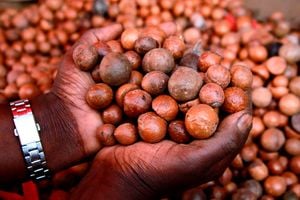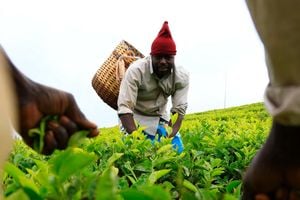
KTDA has stated that it has installed anti-tampering gadgets in weighing scales across its factories nationwide.
As dawn breaks on a cool Saturday morning, Betty Korir heads to her one-acre farm in Kiplokyi village, Bomet County, to pluck green tea leaves.
The mother of two is soon joined by her two casual laborers who are also her neighbours.
Armed with plastic trays, the trio braves the morning chill as they pick fresh tea leaves, adhering to the set standard of “two leaves and a bud.”
Three hours later, having collected enough for the day, they stuff the green leaves into gunny bags and weigh them in a shed at the corner of the farm before transporting them to the local tea collection center.
Ms Korir notes that the weight of the produce is 127 kilogrammes, satisfying the requirements for processing by the Kenya Tea Development Agency (KTDA) Kapkoros tea factory.
The farmer then directs the farmhand to take the leaves to the collection center which is about half a kilometer away where almost an hour and a half later, the KTDA trucks arrive.
The clerks proceed to weigh the farmers' delivered produce before loading it onto the lorry for transport to Kapkoros tea factory.
“Surprisingly, when the KTDA delivery slip was delivered by my workers it showed that the produce was three kilogrammes less than the original weight at the farm (124 kilogrammes),” Ms Korir says.
Initially, she suspects her workers might have sold the produce to middlemen.
However, when she delivers the produce in the following two successive deliveries she finds a consistent pattern of losing between one and three kilogrammes each time.
“After sharing my tribulations with fellow farmers it emerged that the rip-off has also affected them. We raised the issue with the KTDA tea-buying center committee and the Kapkoros tea factory management, but the next time, our fresh produce was rejected over claims it did not meet the required quality – two leaves and a bud,” Ms Korir recounts.
She reveals that farmers who did not complain had their produce weighed and collected without any issues by the KTDA clerks.
“We therefore devised a trick whereby we harvested the tea leaves and handed three quarters of the produce to some of the farmers who were not affected as their own and it was taken without any issue. But part of the fresh farm produce we remained with was rejected,” Ms Korir said.
Outright theft

A tea collection truck delivering green leaves to Mogogosiek tea factory in Bomet County.
It was then that the farmers realised the issue ran deeper than they initially thought, that tea clerks were engaging in outright theft.
The clerks had manipulated the weighing scales to rip off unsuspecting farmers in a scheme involving both junior and senior KTDA employees and unscrupulous traders.
“After illegally deducting the kilograms from the farmers, the clerks tabulate the total weighed per buying center and allocate it to particular agents they have identified, even though they are not farmers,” Mr Peter Kirui, a farmer supplying his produce to Kuresoi tea factory in Nakuru county, stays.
At the end of the month, the agents withdraw the money paid to their respective accounts by KTDA and share the proceeds with the clerks and managers effectively insulating the employees from scrutiny.
This vice is prevalent in Kericho, Bomet, Narok, and Nakuru counties which constitute one of the the highest tea-producing zone in the country.
“This vice has persisted for years despite reports made to the agency and previous crackdowns by various government agencies,” Mr Peter Koskei, a farmer in Litein, Kericho County, laments, noting that some clerks have been arrested in the past.
Lavish lifestyles
The clerks, managers, and their agents have used the illicit proceeds to acquire motor vehicles, land, and decent housing units, engaging in lavish lifestyles inconsistent with their earnings.
Despite KTDA's introduction of digital weighing scales, the agency’s clerks have found ways to tamper with these gadgets and continue to steal from farmers.
Agriculture Principal Secretary Paul Rono witnessed the extent of the issue firsthand on Saturday, October 26, 2024, when a KTDA clerk fled during a random tour at Chepinyonyei tea-buying center in Ainamoi constituency, Kericho County.
The clerk, believed to have been tampering with the weighing scales, ran away in fear of arrest by security officers accompanying the PS.
The incident demonstrated how deeply entrenched the vice is at KTDA.
Farmers claimed that the clerk who took off is among those who had been involved in the tampering of the machines, and the PS directed that investigations into it be conducted and action be taken against the suspect should he be found culpable.
The PS directed that investigations into the matter be conducted, with action to be taken against anyone found culpable.
“The government would not condone corruption and tampering of the digital weighing scales resulting in theft. Tea growers have worked so hard to deliver their produce, and they should be able to make a profit from the investment,” Dr Ronoh said.
KTDA has stated that it has installed anti-tampering gadgets in the weighing scales across its 71 managed factories nationwide aiming to curb the theft of produce in a sector comprising 680,000 small-scale tea producers.
“The cutting-edge anti-tampering device is embedded with a GSM card. This device is designed to detect any attempts to tamper with the scale and instantly trigger an alert to factory managers and other officials,” Managing Director of KTDA Management Services Collins Bett said.
The real-time alert system, according to KTDA management, will enable swift action against suspects.
But despite the agency's claims of continuous upgrades to the digital weighing scales, clerks said to be IT savvy have kept tinkering with them.
In 2020, KTDA introduced digital weighing scales to replace manual ones to address farmer complaints.
Adopting technology
A task force set up in 2007 recommended adopting emerging technologies in weighing tea leaves, leading to the introduction of new machines fitted with weight scales, personal digital assistants (PDAs), portable printers, and server software.
This technology provides reliable backup for data retrieval and accuracy while ensuring that valid growers deliver their produce to collection centers.
At Mogogosiek and Kapkoros tea factories in Bomet counties, over 12 clerks have been dismissed according to KTDA managers.
KTDA vice-chairman Erick Chepkwony assured that the agency does not condone theft by clerks stating that both disciplinary and legal action will be taken against those found culpable.
“Periodically, the systems are audited to ensure they work well to the satisfaction of the tea growers, and the digital gadgets are tamper-proof. We encourage farmers to report any suspicious transactions at the collection centers for action,” Mr Chepkwony said.
Officers from the Weights and Measures department at the national government have also been collaborating with the Tea Board of Kenya to tackle the issue and ensure that only calibrated machines are used by KTDA clerks.
“The Tea Board of Kenya will continuously work with KTDA and other government agencies to ensure that tea growers have confidence in the machines and systems deployed in the tea collection centers. Cases of theft and corruption will be dealt with accordingly,” TBK Chief Executive Officer (CEO) assures, Mr Willy Mutai told Nation.Africa.










